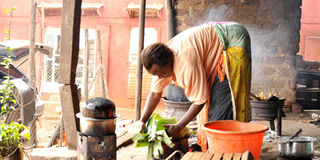Health risks all aging women must know

When women begin to grow older, they are bound to suffer from some serious illnesses, especially when they do not change their lifestyles. Photo by Rachel Mabala.
What you need to know:
- More women than men suffer from inflammation of the joints like knees, elbows, fingers and ankles. Rheumatoid arthritis and osteoarthritis are the commonest forms of degenerative arthritis.
Age relates risks. Besides gray hair, as women grow older, they suffer from some serious health problems. Beatrice Nakibuuka shares some common illnesses.
Maria Nassiwa died of stage IV breast cancer. At 60, she had a lump in her left breast but since it was not painful, she did not find out what it was.
“By the time we took her to hospital, the doctors told us it was too late. She only needed palliative care. After four months, my daughter died,” says Aidah Namyalo.
As we age, our immunity systems weaken, a thing that exposes us to illnesses and disorders. Studies show that some conditions affect women more than men. Although women are known to live longer than men, there are higher chances of developing health complications as they grow older.
Breast cancer
This is one of the commonest form of cancer among women and a leading cause of death among women.
According to Noleb Mugisha, an oncologist at Uganda Cancer Institute, women who are over 50 and diagnosed with breast cancer have a higher mortality rate than those under.
“It is important to understand how to identify breast cancer, get screened for it, and treat it early enough,” he warns.
Some signs of breast cancer include a small lump in the breast, general swelling with or without pain, inverted nipple which assumes an outward or inward position, a discharge from one or both breasts, soreness and pain in one or both breasts.
Heart disease
It is caused by the narrowing of blood vessels that leads to several conditions such as coronary artery disease which occurs when plaque builds up on the inner walls of arteries and other blood vessels.
Dr Judith Namuyonga a paediatric cardiologist at Uganda Heart Institute, says when blood flow to the brain is cut off, it leads to a stroke. It can also lead to heart attacks and an irregular heartbeat (arrhythmias).
Symptoms include shortness of breath, fainting, chest pain, dropping face, numbness in the arms, slurred speech.
“Prevention includes quitting smoking and alcohol intake to reduce the risk of high blood pressure. Avoid a diet consisting of too much sodium, fats, and cholesterol. Eat more fruits and vegetables instead. Consider doing regular exercises in order to maintain a healthy weight,” she says.
Depression
Naturally women are twice more likely to suffer from depression in their lifetime than men, says Edward Ssempiira, a psychologist at Hope and Beyond rehabilitation centre.
The elderly women are very vulnerable to depression, especially if they lose a partner, a loved one or loss of friends.
They tend to develop chronic diseases such as diabetes.
Symptoms of depression include, isolation, a feeling of hopelessness and insomnia, losing interest in things that once were interesting to them, suicidal tendencies,” says Ssempiira.
Arthritis and osteoporosis
More women than men suffer from inflammation of the joints like knees, elbows, fingers and ankles. Rheumatoid arthritis and osteoarthritis are the commonest forms of degenerative arthritis.
They cause depletion of joints over time. Symptoms include pain and stiffness following inactivity, redness, swelling and a decreased range of motion.
Diabetes
Many seniors, both male and female suffer diabetes. The disease affects the body’s ability to process sugar and convert it to energy. If your body can not process sugar, it causes high blood glucose levels, which can lead to health issues such as obesity, cardiovascular disease, vision problems, kidney damage and nerve damage.
If you experience increased urination, extreme hunger, blurred vision, or fatigue, then you need diabetes insulin testing.
Losing weight, a healthy diet and exercises can go a long way in averting the illness.




